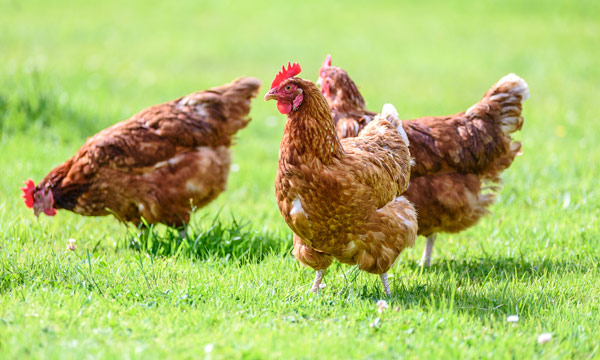SALEM, OR -- Oregon’s Department of Agriculture is again urging the owners of chickens, ducks and geese to take steps to protect their flock from bird flu. "This virus should be assumed to be everywhere," State Veterinarian Dr. Ryan Scholz tells KBND News, "If you have domestic poultry and they have the potential to interact with wild waterfowl, they are at risk, regardless of where in the state you live."
Highly Pathogenic Avian Influenza (HPAI) is transmitted through direct contact, "In a lot of those cases, it’s been a flock of poultry that was mixed species and included ducks or geese and chickens, which is by far the highest risk; where you have some ducks or geese swim on to your little farm pond and then a pair of wild ducks lands, and - even if just momentarily - interacts with those domestic ducks, they then become carriers of the virus and are able to spread the virus to chickens or other domestic species." But Dr. Scholz says this time of year, it’s also spread through indirect contact, like feces, "The virus persists in those droppings this time of year for days to weeks, when it’s cool and wet out."
There was a short break in ag-related cases during the winter, but it was detected in domestic birds in Union and Klamath counties last week, "Over the wintertime, the birds tend to migrate south of us. And the wild waterfowl that do remain here, generally are on larger bodies of water - rivers, lakes - where they’re not interacting directly with our domestic poultry," says Dr. Scholz, "So we see fewer cases during that time." He stresses, though, the virus didn't go away. It's now been detected in wild waterfowl across the globe.
One benefit of the COVID-19 pandemic in humans, says Dr. Scholz, is a better understanding of biosecurity precautions, which he believes leads to better outcomes during this HPAI pandemic, "Because, previously, it was this abstract contract we deal with our animals. And now, we’ve all been through that ourselves." The best protection, he says, is to practice good biosecurity and keep domestic poultry - like chickens, ducks and geese - away from wild birds and the places they frequent.
Bird flu is now so common in Oregon, the state’s Department of Agriculture is only issuing notices when a county has its first case in a domestic flock. For more on the virus and information on current outbreaks, click HERE.
Last week, Dr. Scholz sent a letter to the owners of domestic poultry flocks, reminding of the need to take precautions:
Dear Oregon Poultry Producers,
As you are undoubtedly aware, over the past year the US has been in the midst of a nationwide outbreak of European lineage H5N1 Highly Pathogenic Avian Influenza (EA H5N1 HPAI) in wild waterfowl and domestic poultry. While we have experienced a relatively quiet winter, ODA has diagnosed two new cases of HPAI in the past week within Oregon (Klamath & Umatilla counties).
While the risk of Avian Influenza is always present from interactions with wild waterfowl in the Pacific Flyway, we know that H5N1 HPAI is still frequently detected in wild waterfowl within the Pacific Flyway. The continued presence of HPAI in the pacific flyway, coupled with the beginning of Spring migrations has resulted in an ongoing risk of HPAI exposure in Oregon.
The trajectory of cases over the past year has shown traditional assumptions about periods of risk and persistence of an HPAI virus within wild reservoirs are no longer correct, and at this point, we do not have a good timeline for when we expect the risk to subside. I encourage you to remain vigilant and continue to maintain your enhanced biosecurity measures, such as limiting non-employee access to your barns and suspending outdoor access in flocks where there is a risk of wild bird interactions at least through the end of the spring migratory season (June 30).
If you have any additional questions, please do not hesitate to contact me.
Sincerely,
Ryan Scholz, DVM MPH
Oregon State Veterinarian
Oregon Department of Agriculture




